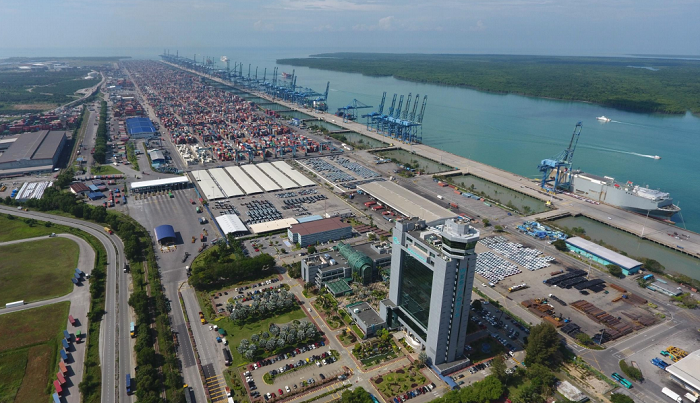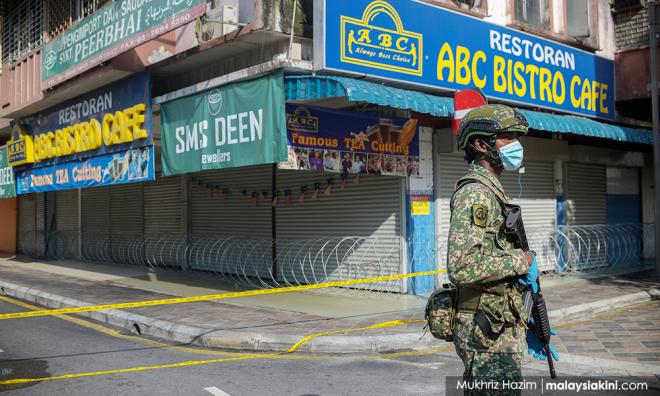
Published in Malay Mail & Sin Chew. image from Malay Mail.
Lifting the movement control order (MCO) to revive the economy would not be something easy given that the invisible enemy (Covid-19) is still around because of the fine balance between MCO and economic death. Hence, wrong choices could lead to more infections, another round of movement restrictions and additional economic pain on top of the painful situation that we are already facing now.
A chief economic advisor from Allianz named Mohamed El-Erian said, “Restarting the economy is a lot more than just “flicking on a switch”.”
Nevertheless, the country needs to start somewhere based on the right priorities, as the economy cannot afford any further damage.
To give you an idea, Denmark with 5,402 cumulative confirmed cases and one of the first countries to shutter its economy in responding to the deadly Covid-19 outbreak is attempting to resume the economy, according to Danish Prime Minister Mette Frederiksen.
After Easter, the government will begin discussions with the business leaders on gradually bringing employees back into office. Kindergartens and schools would also be open after a month of closure.
Notwithstanding the effort to start over, Frederiksen noted that immediate resumption of restrictions would be imposed should there be any signs of cases rising. Shutdown of borders and travel restrictions remain, gatherings involving more than 10 people are still banned, and eateries as well as bars will remain closed.
In Malaysia’s case, first of all, the economy can be resumed gradually but different standards should be imposed for different regions. The government can begin by lifting restrictions in the low-infected areas coupled with adequate precautions such as continuation of temperature checks and physical distancing at work while halting activities in areas with high infections (red zones).
The Ministry of Health (MOH) has done an excellent job by declaring data comprising zones with updated number of cases on a daily basis. Red zones represent the districts with at least 41 cases and to date, Malaysia has 24 red zones. Below red zones, there are orange zones (20-40 cases), yellow zones (1-19 cases) and green zones (no cases).
The level of restrictions could be regulated according to the development of infected cases in each zone but data transparency to the public remains the key to ensuring compliance and the effectiveness of enforcement.
Secondly, limitations on the function of public transportation should also be maintained or tightened further after the MCO. The operation hours that have been set at two durations: from 6am to 10am and 5pm to 10pm should remain and the number of commuters on board could also be reduced to continue the practice of social distancing.
Thirdly, to control the hassle in using public transport with tighter protocols, government and private companies could continue implementing remote-work policies for the next few months if tasks can still be performed this way.
Despite having to face challenges such as lack of face-to-face supervision and access to information, as well as home distractions, the following are suggestions from Harvard Business Review to support the employees:
- Daily check-ins by the supervisors;
- Provision of different channels of technological communication;
- Establish rules for remote communication;
- Provide opportunities for social remote interaction; and
- Supervisors to offer encouragement and emotional support.
Finally, for sectors such as retail in which some business players are still in brick-and-mortar stores before the MCO, several alternatives can be experimented to restart the businesses in the post-MCO period. Some of the proposals made by McKinsey include online marketing campaigns and tax exemptions on e-commerce in a move to promote shifting to e-commerce.
Shifting to online businesses would help local businesses to cater the behavior of consumer spending that possibly have changed over the MCO. The pandemic has resulted in households shying away from shopping malls or streets and this may prolong even after the MCO is over.
As an initiative to move toward digitalization Selangor made the first move by partnering with Grab Malaysia in introducing the E-Bazar Ramadan Selangor Grab as an alternative to the cancellation of bazaars during the upcoming fasting season. This in return would help the small traders to earn incomes amid this difficult time and it would also help combat the spread of virus.
Digitalization might not work for some businesses. As an alternative, the business players can implement measures such as a two-team maneuver where workers alternate between remote work and having to be present in the stores, reducing store capacity on per square meter basis, and setting a timetable of different check-in and check-out times for each employee.
However, these responses that are more focused toward the economic side should go hand in hand with public health rescue plan.
Back to Denmark’s attempt to restart its economy, its prime minister did not leave off without emphasising that increased healthcare resources to step up on testing was the key part of strategy to gradually open the Danish economy.
It is the same for Malaysia. The capacity of testing facilities and kits has to constantly be improved while restoring the economy. Hopefully, the test kits expected from South Korea by this week would be proven 80 per cent reliable, as reported, to ensure accuracy and more widespread testing.
Proposal of measures could be never-ending but it all goes back to execution, as the saying goes “actions speak louder than words”. Policy planning is one part but execution is the key to its effectiveness.
An all-government approach is needed to constantly address the pandemic matter by establishing a Covid-19 task force of all government ministries and most importantly, all regional and city governments, as what was done in South Korea.
Saving lives is equally important as saving the economy. Neither one should be the opportunity cost of the other so the idea of there is a choice between these two is just wrong, according to former US presidential hopeful, Elizabeth Warren.
Hopefully, urgent and consistent coordinated efforts would ensure sustained recovery for Malaysia.
Nur Sofea Hasmira Azahar is Research Analyst at EMIR Research, an independent think tank focused on strategic policy recommendations based on rigorous research.
刊登于:星洲网 (Sin Chew)
鉴于隐形敌人仍在身边危机四伏,解除行动管制令以恢复经济并非易事,两者之间要取得平衡难度高。因此,错误的抉择可能导致更多的感染,和除了我们现已经面对痛苦局面外,另外又带来新一轮的行动管制和额外的经济痛楚。
安联集团首席经济顾问莫哈末伊尔艾朗曾表示,“重启经济不仅仅是‘轻按开关键’如此简单。”
尽管如此,国家仍需要从正确的优先事项出发,因为经济无法承受进一步的损害。
举例说,累计5402宗确诊病例的丹麦,作为其中一个很早就落实管制以阻致命疫情的国家,其首相弗雷泽里克森日前表示,已准备重启经济。复活节后,该国政府将和商界领袖商讨逐步让员工恢复上班,幼儿园和学校也将在关闭1个月后,重新上课。
尽管为恢复原状做好准备,但弗雷泽里克森表示,一旦有任何迹象显示确诊病例再度上升,会再重新落实管制,且边界关闭和旅游限制维持不变,超过10人的聚会依然禁止,而小吃店和酒吧仍旧关闭。
在大马,首先是经济可逐步恢复,但各地区应有不同的标准,政府可以在那些低感染地区解除行动管制,并采取适当的防御措施,例如持续测量体温、职场中保持适当距离,而高感染地区(红区)则继续停止活动。
各区的管制程度可以依照确诊病例来调整,但对大众保持资讯透明仍是关键,以确保人人遵守规定和有效执法。
第二,对公共交通运作的限制,在行动管制令后应维持不变或进一步加强,其营运时间应分2个时段:从早上6时至10时,及下午5时至晚上10时应不变,而乘客人数可减少,以继续落实社交距离。
第三,为了减少使用公共交通,政府及私人企业在接下来的数个月,如能通过远程办公完成任务,应继续落实这类政策。
虽然居家工作面对一些挑战,例如缺乏面对面监督、无法获取讯息及在家会分散注意力等,但以下是《哈佛商业评论》给予员工支援的建议:
- 主管每日点名检查;
- 提供不同的技术交流管道;
- 建立远程沟通规则;
- 提供远程社交互动机会;
- 主管提供鼓励和情感支援。
最后,一些领域例如零售业,部分业者在行动管制令前仍在经营实体店,在行动管制令后,可尝试不同的方法以重启生意,麦肯锡咨询公司提供一些建议包括线上营销活动及让电子商务免税,以促进生意转向电子商务。
将生意转向网路,有助于本地企业迎合消费者在行动管制令期间,所可能改变的消费模式。这波疫情已导致家庭用户避开购物广场或出街,这样的情况可能在行动管制令结束后,仍持续下去。
为了推动数字化,雪州政府首次与大马Grab公司合作,推出线上斋戒月市集,作为取消传统斋戒月市集的替代选择。这项新尝试可助小贩在这艰难时刻赚取收入,与此同时也对抗病毒传播。
一些商业可能不适用数字化,作为替代选择,商家可以落实两组员工分开上班措施,一组人远程办公,一组人在店上班,但根据每平方尺减少人流量,并让每位员工隔开上下班时间。
无论如何,这些更侧重于经济方面的应对措施,应与公共卫生拯救计划齐头并进。
回到丹麦试图重启经济一事,其首相已强调,要提供更多医疗资源,增加检测病毒数量,是逐步重新开放该国经济的关键策略点。
对大马而言也是一样。要重启经济,同时间也要提升检测数量,希望来自韩国的检测剂成功率可达80%,确保其准确度和更大范围检测。
提议各种措施可能没完没了,但最终都回归到执行面上,俗话说“行动胜于雄辩”,策略规划是其中一部分,但执行才是有效与否的关键。
我们需要一个涵盖各级政府的措施,就如韩国所做的一样,成立一个跨越所有政府部门、及各区、各城市政府的防疫特工队,持续地解决疫情所带来的问题。
拯救生命和拯救经济同等重要。已退选的美国民主党总统参选人沃伦曾表示,任何一方都不应该是另一方的机会成本,因此要在两者之间进行选择的想法是错误的。
盼望这一切紧急与一致协调的努力,将确保大马持续复苏。
苏菲雅阿兹哈是EMIR Research的研究分析员, EMIR Research是一个独立的智囊团,专注于根据严格的研究提出战略政策建议。

